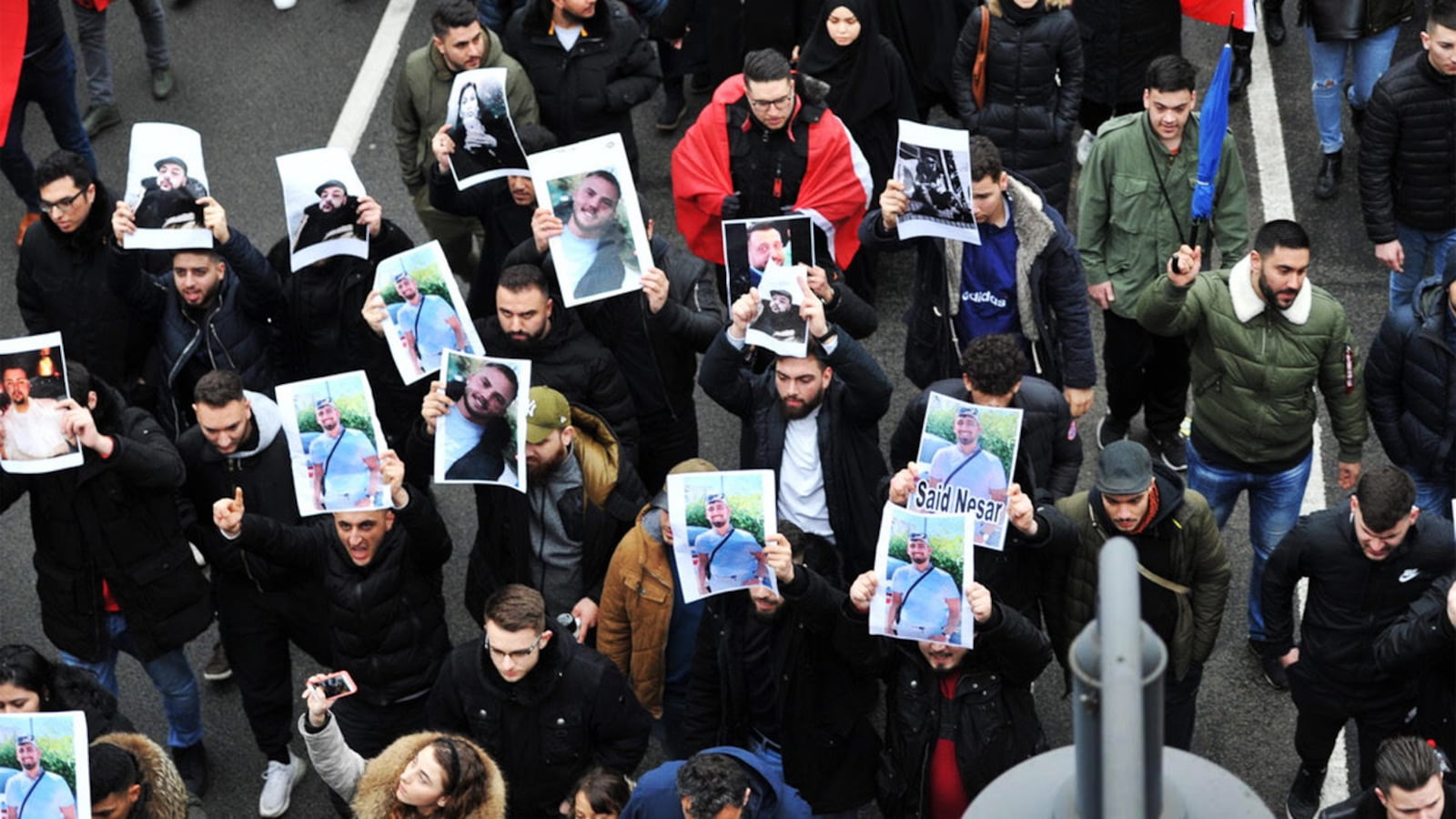BERLIN—Apocalyptic scenarios like those painted for the coronavirus pandemic are exactly what your average neo-Nazi ordered. The far-right’s theory goes that, as the existing democratic system is brought into disarray, a new anti-globalist world order will arise to be run by the far-right. Borders will be drawn all over the place, nationalism will be whipped up, and racial purity assured.
“Right wing radicals want to accelerate and exploit societal crises,” Matthias Quent, director of the Institute for Democracy and Civil Society in the German state of Thuringia, wrote in Die Zeit this week. Extremists already are trying to blame the current pandemic on a variety of scapegoats, he noted. During the Middle Ages, the Black Death was often blamed on Jews and many Jewish communities were wiped out as a result. In Germany, the racism recently focused on Asians thought to have brought “the Wuhan virus” from China. But the hate-monger’s spotlight can always find someone whose language, faith, or skin color is a problem
In Europe today, Quent wrote, right-wing extremists refer to the coronavirus as an “accelerant” that can help undermine local democracy and bring about the kind of system they’d prefer, if a looming economic recession drives dissatisfied voters toward populist, right-wing politicians.
What’s especially disturbing is evidence that German authorities have been even more slow to react in the face of the far-right terrorist threat than they were to the challenge of the pandemic.
A spate of recent attacks, including nine murders in the city of Hanau in February, the shooting near a Halle synagogue in October last year, and murders by the so-called Nationalist Socialist Underground between 2000 and 2007, all shared aspects of this apocalyptic theme.
“Far-right extremists and the coronavirus pandemic have more in common than you might think,” Quent wrote. “Both are dangers that need to be contained at an early stage.”
Unfortunately, he goes on, that has not happened in Germany when it comes to the far right. And Quent is not alone in this conviction. Last May, around 60 percent of over 5,000 Germans surveyed said the government had not been doing enough to counter the threat of far-right extremism.
A closer look at the annual report produced by the German intelligence agency tasked with spying on extremists inside the country suggests the critics are right. Germany has been counting its potential domestic terrorists since the 1960s. And this document, issued by the agency known as the Office for the Protection of the Constitution, includes chapters on neo-Nazis, jihadists, militant anti-fascists and other would-be troublemakers.
Between 2002 and 2012, the agency's chapters on right-wing extremists were an average of 82 pages long. During that same decade, chapters on left-wing extremists and Islamist extremists were smaller, on average, 51 and 48 pages long. But over time, the chapter sizes have changed. Now they are all about the same size, around 50 pages each.
That can be seen as a metaphor for the way that Germany’s focus on extremism has changed over the past decades. Because over time, German authorities appear to have come to consider all extremists equal.
"If right wing extremism is mentioned in politics, then there is always a mention of left-wing extremism," says a spokesperson from the Amadeu Antonio Foundation, a Berlin-based organization working against the far right, racism and anti-Semitism. "But this is false equivalence. There have always been more right-wing extremists and they have always been more dangerous."
A closer reading of those annual reports by the Office for the Protection of the Constitution, or BfV for short, confirms this. Each year, on average, right wing extremists commit around 16,500 politically motivated crimes. Left wing extremists commit only a quarter of that—around 4,200 annually, on average—and Islamist extremists even less. Records for crimes motivated by religion have only been kept since 2017 and previous to that, Islamist-inspired crimes were a subset of “politically motivated crimes by foreigners.” But even if you average out those numbers for the decade before 2016, this category still averages only 980 crimes a year.
In terms of deaths, the far right is thought to be responsible for around 200 deaths in Germany since 1990. Islamist extremists are though to be responsible for 14—the count is disputed but that is one of the higher estimates.
“There’s no question about it,” says Daniel Koehler, who heads the German Institute on Radicalization and De-radicalization Studies, or GIRDS. “Whatever metric you look at—murders, arson attacks, explosives, grievous bodily harm, plots or attacks on infrastructure; the majority come out of the far right. Statistically, there are two to three incidents of physical harm committed by far-right extremists every day [in Germany].”
“Yet in Europe we have not considered right wing terrorism a serious threat until now,” argues Francis O’Connor, a post-doctoral researcher who previously worked at the Peace Research Institute Frankfurt and is currently working on a book about “lone actor” terrorism; O’Connor notes that the same conclusions have been drawn in the UK and the U.S. by groups like the Southern Poverty Law Center. “It’s just a fact.”
But why? In Germany, critics have blamed a conservative government and security agencies. “The police and the BfV have been weak and have repeatedly attracted attention because of right-wing extremists within their own ranks,” the Amadeu Antonio Foundation argues, referring both to recent terror cells found inside the German military and police, and to the nine murders by the National Socialist Underground, where German police did not investigate far right links to the killings. “They have lost a lot of trust.”
The BfV is supposed to be politically neutral but the Interior Ministry, which oversees it, traditionally has been headed by conservative politicians, several of whom have made controversial statements about local Muslims and migrants in the past. As Francis cautions, “there are members on the right wings of Germany’s conservative parties who probably agree with some of the things the extremists say.”
The BfV’s Hans-Georg Maassen, who headed the office between 2012 and 2018, has come in for particular criticism. “Maassen … has a weakness for right-wing conspiracy theories and focused most of his attention on the left and on Islamism,” Markus Feldenkirchen, an op-ed writer with the weekly news magazine Der Spiegel, wrote after recent murders in Hanau. “And few seemed particularly bothered by that.”
Maassen was fired from the BfV—probably the most important body when it comes to this topic—because in the summer of 2018 he appeared to sympathize with right-wing, anti-immigrant protesters in Chemnitz. He has since confirmed suspicions about his political allegiances by making similar statements in public. Straight after the Hanau murders, when the killer’s motivations were still being discussed, Maasen tweeted that it was simply liberals’ logic to say “Perpetrators are always right wing, victims always left wing.”
GIRDS’ Koehler, one of the country’s foremost experts on the subject, thinks that it’s incorrect to blame a single politician or agency. It’s more complex because so many offices, prosecutors, police and other staff are involved and often political leadership changes with every election. “So I wouldn’t say [German authorities] have been ignoring it, they’ve just had different priorities,” he suggests. “It is true they have underestimated the far right for years. But,” he says, “they are not actively looking away.”
It’s also about public threat perception, Koehler continues. After 9/11, human and financial resources were shifted into the fight against Islamist terrorism and that’s where the resources stayed—possibly because, until 2015 and the influx of refugees, Germany hadn’t seen any surge in far-right violence since the 1990s.
A 2019 study by American academics titled “Why Do Some Terrorist Attacks Receive More Media Attention Than Others?” found that if an attack was perpetrated by a Muslim it received, on average, 357 percent more media coverage and as much as 758 percent more in mainstream U.S. press. Experts agree that up until very recently, the German media have also behaved similarly.
It's also quite possible that Germans might be more afraid of jihadis—people who look very different from them and whose language they can’t understand—than, say, neo-Nazi skinhead teenagers from down the road, who some Germans will even relate to, Koehler explains. It’s all about “fear of the other.” And voters’ perceptions about who is dangerous and who isn’t obviously impacts government spending.
Since 9/11, there has been an overwhelming focus on research into Islamist extremism, Bart Schuurman, an assistant professor at the Institute of Security and Global Affairs in the Netherlands, concluded in a 2018 analysis of how terrorism research is funded. This has fostered the perception that terrorism is something only Islamists do, he wrote. “This is not only incorrect, but a potentially dangerous blind spot as it allows non-jihadist forms of extremism to develop and be carried out relatively unnoticed,” Schuurman argued.
Because of how they tend to behave, in ways that can be misinterpreted or overlooked by security agencies, right wing extremists have been able to exploit this, Koehler confirms. For one thing, they tend not to commit large, indiscriminate attacks and only rarely claim responsibility for their crimes. “Neo-Nazis opt to quietly kill targeted individuals, and they work over longer periods of time,” he says. “They don’t want that public focus. They’re often only interested in terrorizing the targeted community and sending a signal to their far-right in-group.”
Spotting the extremists in Germany has become even more difficult today, as lone actors radicalize online and social boundaries are blurring, where hardline extremist groups meet supporters of far-right political parties, like the Alternative for Germany. “This is where the angry citizen, or the outraged citizen, meets the real neo-Nazi,” Koehler explains. “The threshold between the extremists and the political right is being erased by parties like the AfD.” In recent profiling of perpetrators, security agencies have discovered that violent acts like arson are being committed by ordinary Germans, with no previous ties to the far right.
The good news is that, due to recent events, priorities are changing in Germany and elsewhere. Justice advocates and liberal politicians are calling for campaigns to eradicate covert, community-wide racism that underlies that “fear of the other” and to stop focusing on individual cases, rather than the phenomenon.
Much to the surprise of many, German Interior Minister Horst Seehofer, one of the country’s most prominent conservatives, even came right out and said it after the Hanau attack, possibly for the first time ever: Confronted with this “bloody trail” left by right wing terrorism, he told his colleagues, Germany must no longer equate right-wing extremism with left-wing extremism. Right wing extremism “is the greatest security threat in our country” Seehofer said.
And late last week the BfV demonstrated just how seriously it is taking that statement, declaring that from now on it would be surveilling a far-right group known as “der Fluegel,” or “the Wing,” with about 7,000 supporters inside the Alternative for Germany party.
Right wing extremists are just looking for the kind of crisis that could start a civil war, BfV head Thomas Haldenwang warned, as he announced the move. The COVID-19 pandemic could be that crisis. “Today we know that democracy can break down when its opponents destroy it from within,” he cautioned. “That is the warning from our history.”







